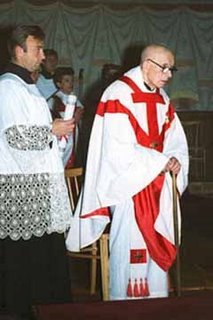
Q. The quote I am posting below proves that the R.C. church teaches equality between scripture and the catechism.
The Documents of Vatican II
Hence there exist a close connection and communication between Sacred tradition and sacred Scripture. For
both of them, flowing from the same divine wellspring, in a certain way merge into a Unity and tend toward the
same end. For sacred Scripture is theWord of God inasmuch as it is consigned to writing under the inspiration
of the divine Spirit. To the successors of the apostles, sacred tradition hands on in its full purity God’s word,
which was Entrusted to the apostles by Christ the Lord and the Holy Spirit . . . Consequently, it is not from
sacred Scripture alone That the Church draws her certainty about everything which has Been revealed.
Therefore both sacred tradition and sacred Scripture are to be accepted and venerated with the same sense of
Devotion and reverence. Sacred tradition and sacred Scripture form one sacred deposit of the word of God,
which is committed to the church (p.117).
The Question and Answer Catholic Catechism
59. Where do we find the truths revealed by God?
We find the truths revealed by God in Sacred Scripture and Sacred Tradition.60. How does Sacred Scripture compare with Sacred Tradition?
Both Sacred Scripture and Sacred Tradition are the inspired word of God, and both are forms of divine
revelation. Sacred Scripture is divinely inspired writing, whereas Sacred Tradition is the unwritten word of
inspired persons.89. Why is Sacred Tradition of equal authority with the Bible?
The Bible and Sacred Tradition are of equal authority because they are equally the word of God’ both derive
from the inspired vision of the ancient prophets, and especially from the infinite wisdom of God incarnate who
gave to the apostles what he came down on earth to teach, through them, to all of mankind.
A. I do not deny that they are of equal authority. But, many imagine that because of the equality of Scripture and Tradition, Catholic doctrine could be almost anything. And that the Catholic Church therefore, ends up with all kinds of Doctrines diametrically opposed to Sacred Scripture. But that is NOT how it works. The beliefs of the the Church existed FIRST. Scripture and the Teaching of the Apostles or Sacred Tradition are cited to support these doctrines.
Jesus—>Christian Faith—> Authentic Apostolic Teaching—>Oral and Written =Tradition and Scripture
And I can assure you NOTHING that the Church believes contradicts one thing in Sacred Scripture.
It is the BELIEFS of Protestants and their INTERPRETATION of scripture that contradicts Catholic Doctrine.
The reason for this is that both Sacred Scripture and Sacred Tradition were DERIVED out of the FAITH and the CHURCH founded by Jesus Christ. So, the Bible does not contradict Catholic Doctrine and Catholic Doctrine does not contradict the Bible.
The only thing that contradicts Catholic Doctrine are Protestant Doctrines derived from various interpretations of Sacred Scripture 1500-2000 years after they were written.
Q. How do you relate John 21:25 to oral teachings?
A. John 21:25
Jesus did many other things as well. If every one of them were written down, I suppose that even the whole world would not have room for the books that would be written.
The reason for citing this verse is to point out that Jesus did and said many, many things that did not get written down in John’s Gospel or even the rest of the NT. For instance, all that Jesus explained to the disciples on the road to Emmaus. Now Protestants will just say “We don’t need anything more than what was canonized.” But Catholics would disagree saying that the fullness of the Faith did not get written into the Canon of Scripture. Nothing in scripture says Scripture is enough. Therefore, this passage in John shows that there is nothing wrong with accepting unwritten teachings of the apostles which we call TRADITION. Traditions of men is something completely different. And St. Paul even exhorts the Thessalonians to hold firmly to what he taught them, both written and ORAL.
So then, brethren, stand firm and hold to the traditions which you were taught, whether by word of mouth or by letter from us.
Q. What about 2 Thess. 2:15? Remember scripture backs scripture.
A. I agree.
Q. Oral traditions get lost over time, but the written word of God has withstood time and persecution.
A. I would have to say the same thing about the Catholic Faith. Where in scripture does it teach that oral traditions get lost over time? I would contend that the Oral teachings of the Church were eventually written down and God has by HIS power protected and preserved the TRUTH within the One,Holy,Catholic, and Apostolic Church.
Q. How can you possibly follow “oral” traditions handed down over 2000 years ago?
A. I believe that God protected the purity of the Faith handed on by word of mouth just as St. Paul taught in Scripture. You believe in the inspiration of the Old Testament don’t you? Moses wrote down the first five books of the OT. The events he recorded were thousands of years before his time. We both believe that God safeguarded the truth to Moses several thousand years later. While on the other hand Sacred Tradition began to be written down within one hundred years after Christ’s resurrection. We reject any and all writings, no matter how old they are if they do not align with scripture and the Faith as always believed and taught. I am sure you believe God could have done this. The question you must decide is, “Did He?”



 Posted by bfhu
Posted by bfhu  Blessed Tymoteusz Trojanowski Religious and Martyr
Blessed Tymoteusz Trojanowski Religious and Martyr St. Gabriel of Our Lady of Sorrows Religious
St. Gabriel of Our Lady of Sorrows Religious
 Blessed Piedad della Croce Ortiz Real
Blessed Piedad della Croce Ortiz Real Blessed Averto di Lucca
Blessed Averto di Lucca Blessed Arnaldo Carcassone Mercedario
Blessed Arnaldo Carcassone Mercedario A few years ago, I went to an annual Christmas display at the local department store. In line ahead of us there was a family. My mom said the kids couldn’t all be theirs; there were 8. The line we were in was quite long, and I heard the family talking. The girls had names like Ann, Catherine and Bridget…typical Catholic names. We just speculated but someone ahead of us in line asked.
A few years ago, I went to an annual Christmas display at the local department store. In line ahead of us there was a family. My mom said the kids couldn’t all be theirs; there were 8. The line we were in was quite long, and I heard the family talking. The girls had names like Ann, Catherine and Bridget…typical Catholic names. We just speculated but someone ahead of us in line asked. Blessed Wincenty Stefan Frelichowski
Blessed Wincenty Stefan Frelichowski Roman Martyrology: Feast of the Chair of St. Peter the Apostle, to whom the Lord said: “You are Peter and upon this rock I will build my Church.” On the day on which the Romans used remember ttheir dead, we honor the place of birth to the sky quell’Apostolo, taking the glory from his victory on the Vatican Hill and asked to preside over the universal communion of charity.
Roman Martyrology: Feast of the Chair of St. Peter the Apostle, to whom the Lord said: “You are Peter and upon this rock I will build my Church.” On the day on which the Romans used remember ttheir dead, we honor the place of birth to the sky quell’Apostolo, taking the glory from his victory on the Vatican Hill and asked to preside over the universal communion of charity. 










 Blessed LOUIS MZYK, Priest
Blessed LOUIS MZYK, Priest  Blessed Jozef Zaplata, Religious and Martyr
Blessed Jozef Zaplata, Religious and Martyr Blessed Jerzy Kaszyra priest and martyr
Blessed Jerzy Kaszyra priest and martyr
 Beato Luca Belludi Franciscan
Beato Luca Belludi Franciscan Blessed Giuseppe Allamano
Blessed Giuseppe Allamano
 Blessed Vicente Vilar David
Blessed Vicente Vilar David
 Blessed Berengar of Assisi Mercedario
Blessed Berengar of Assisi Mercedario
 Blessed Bartolomeo di Olmedo
Blessed Bartolomeo di Olmedo Blessed José Sanchez Del Rio
Blessed José Sanchez Del Rio Recent stupid comments by an illicitly consecrated bishop that helps
Recent stupid comments by an illicitly consecrated bishop that helps 

 Blessed Luis Magaña Servin
Blessed Luis Magaña Servin Blessed Josephine Gabriella Bonino
Blessed Josephine Gabriella Bonino

 Blessed Elisabetta Canori Mora
Blessed Elisabetta Canori Mora St. John de Britto
St. John de Britto
 Blessed Marie Ann Rivier
Blessed Marie Ann Rivier![[NellieB.jpg]](https://i0.wp.com/bp0.blogger.com/_a2J5tLF3HXg/R_bD6Z1brUI/AAAAAAAAAIY/SE-VEOr-C5s/s1600/NellieB.jpg)
 Blessed Andrea Carlo Ferrari
Blessed Andrea Carlo Ferrari